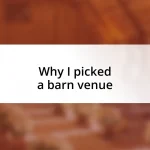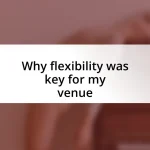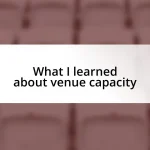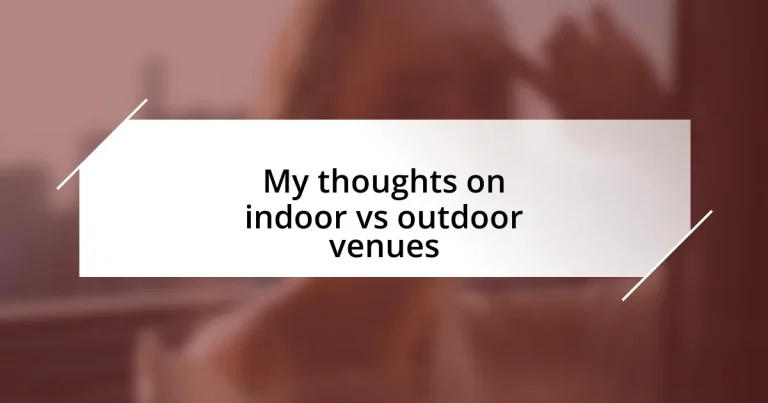Key takeaways:
- Indoor venues provide protection from unpredictable weather, allowing for a controlled ambiance and better acoustics, enhancing guest experiences.
- Outdoor venues offer a natural backdrop and ample space for events, fostering mingling and a unique connection to nature.
- Cost implications vary; indoor venues may have higher upfront costs but include essential amenities, while outdoor venues can incur additional rental and permit expenses.
- Sound quality can vary significantly between venues, impacting the overall experience and engagement of guests.
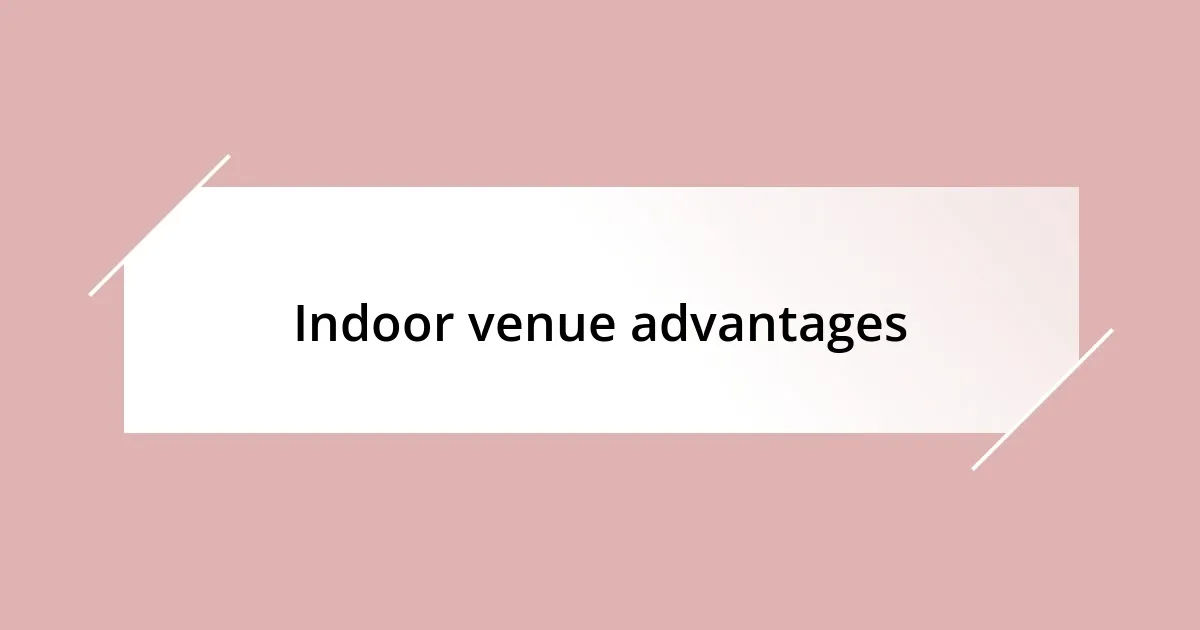
Indoor venue advantages
Indoor venues offer a unique sanctuary from unpredictable weather conditions. I remember attending a wedding where the sun suddenly decided to play hide-and-seek on the big day. Had it been an outdoor venue, guests would have been scrambling for cover, but instead, we celebrated in a cozy, beautifully decorated hall, completely sheltered from the elements. Isn’t it comforting to know that unexpected rain can’t dampen an indoor celebration?
Another advantage is the acoustics that most indoor spaces provide. I’ve been to concerts where indoor venues transformed the audio experience into something truly magical. The way the sound waves bounced off the walls created an immersive experience that simply can’t be replicated outside, where sounds can get lost in the breeze. Don’t you appreciate when every note and lyric can be heard crystal clear?
Lastly, indoor venues allow for more control over ambiance and ambiance really sets the mood. Just thinking about events I’ve attended, I recall how the soft lighting and thematic decorations made everything feel intimate and inviting. When hosting an indoor event, you can easily manipulate elements like lighting and temperature, tailoring the environment to fit your vision perfectly. Isn’t it lovely to know that you can create just the right vibe for your guests?

Outdoor venue advantages
Outdoor venues come with a breath of fresh air and a sense of freedom that can elevate any occasion. I still vividly recall attending a summer garden party where vibrant flowers and the gentle rustle of leaves created such a serene backdrop. It’s those little details—like a gentle breeze and the warmth of the sun—that can make moments feel even more special, right?
One undeniable advantage of outdoor venues is the ample space they offer. At one memorable music festival I attended, the expansive layout allowed for dancing and mingling without feeling cramped. When everyone can spread out and truly enjoy themselves, the energy of the event becomes infectious, don’t you think?
In addition, outdoor venues provide a stunning natural backdrop that enhances the visual appeal of gatherings. I once witnessed a breathtaking sunset during an outdoor wedding, where the sky turned hues of pink and orange. The couple exchanged vows while the sun dipped below the horizon, and it felt like a scene straight out of a fairy tale. Moments like these remind me how nature can weave its magic into our celebrations.
| Advantage | Description |
|---|---|
| Natural Ambiance | Outdoor settings provide a picturesque backdrop that enhances visual appeal. |
| Space to Explore | Ample space fosters mingling and engagement, creating a lively atmosphere. |
| Weather Connection | Being outdoors can create a connection to nature, enhancing the overall experience. |
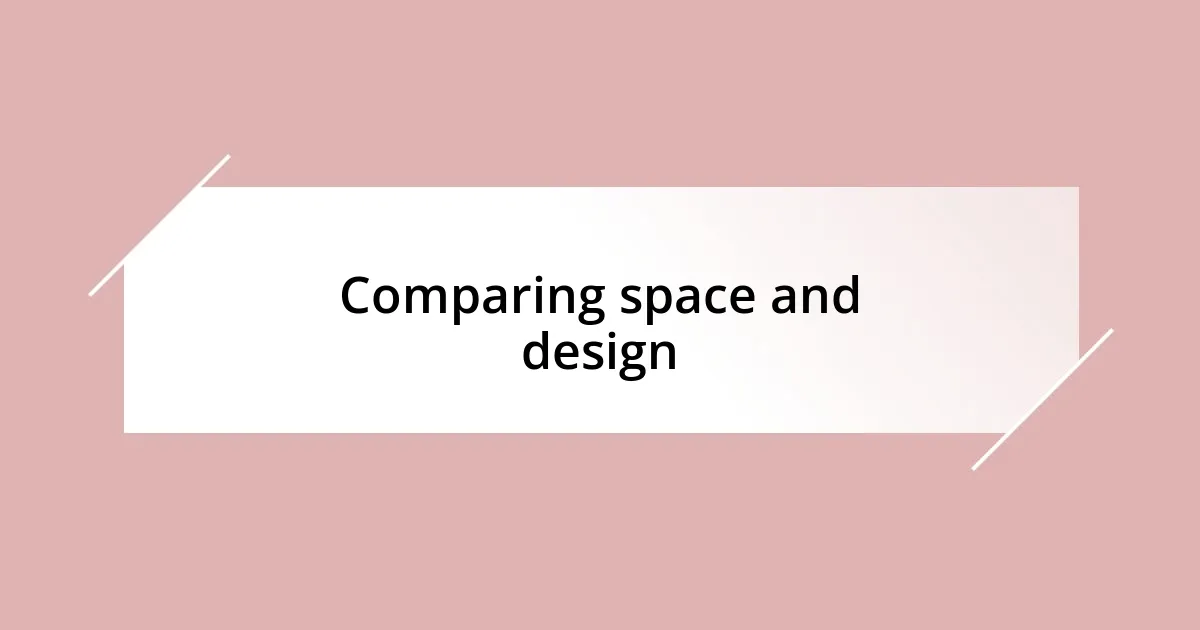
Comparing space and design
Indoor venues and outdoor spaces offer distinct opportunities in terms of space and design that can significantly impact an event’s atmosphere. I recently attended a corporate gathering in a spacious gallery where high ceilings and open areas made the event feel both grand and intimate. The elegant layout allowed for different stations—like a bar area and discussion spaces—that created a natural flow while maintaining personal interactions. It was a perfect example of how thoughtful design can truly enhance guest experiences.
On the other hand, outdoor venues often embrace the beauty of their surroundings in unique ways. I remember a wedding that took place at a vineyard; the rows of lush grapes provided a romantic setting that was both relaxed and visually stunning. The design was so carefully integrated with nature that it felt seamless and immersive. Here are some aspects to consider:
- Flexibility in Layout: Indoor spaces can be adapted in ways that outdoor venues sometimes can’t, allowing for dynamic setups.
- Natural Elements: Outdoor venues can incorporate elements like water features or trees, which add depth and intrigue.
- The Scale of Experience: Both types offer different scales; indoor venues can be tailored for intimacy, while outdoor spaces can host larger gatherings with an open feel.
Balancing design with the natural world creates a unique dialogue that can elevate any event.
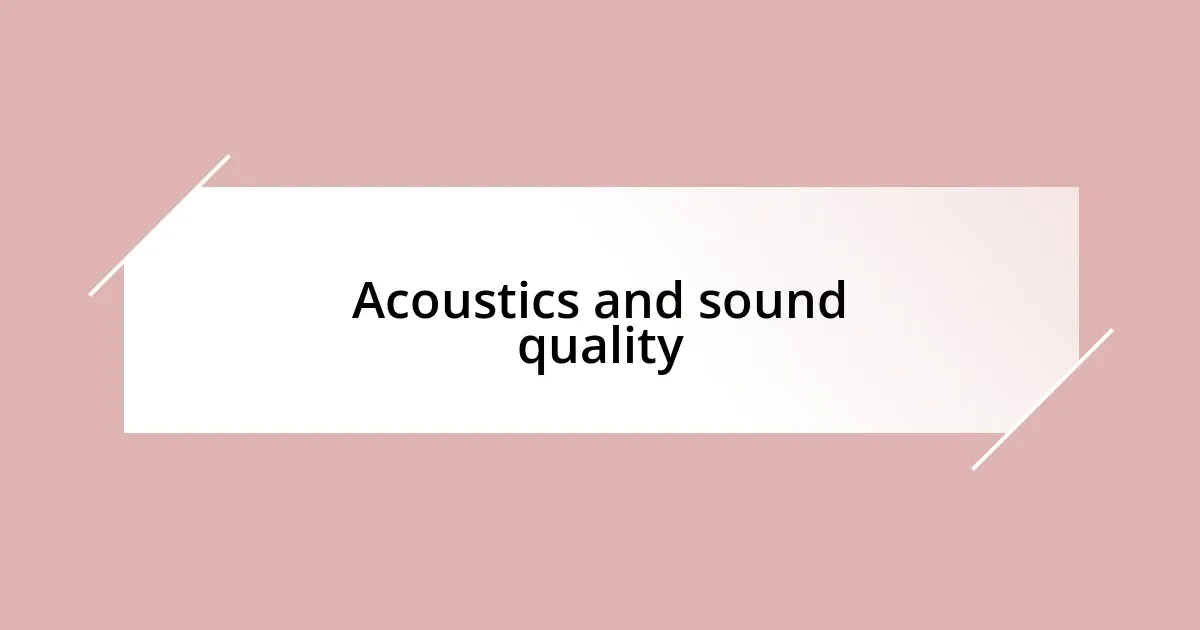
Acoustics and sound quality
When it comes to acoustics and sound quality, I’ve noticed a clear distinction between indoor and outdoor venues. I remember attending a concert in a stunning amphitheater surrounded by trees. The natural sound waves reverberated beautifully, creating an experience that felt immersive and alive. The way music can travel in an outdoor setting often seems to resonate with the environment.
In contrast, I’ve also been to various indoor events where the acoustics were less than ideal. At one corporate gala, the high ceilings were visually appealing but made it challenging to hear the speaker clearly. It was frustrating at times, causing disengagement among the audience. This highlights the importance of sound design in indoor spaces—a carefully designed space can significantly enhance sound quality.
Ultimately, the listener’s experience is paramount, and I believe it’s worth considering how every venue’s unique acoustics can evoke different emotions. Have you ever felt completely swept away by the sound in one space but lost in another? The acoustics play a vital role in creating those memorable moments, shaping our connection to the event itself.

Weather considerations
When it comes to weather considerations, the unpredictability of nature can greatly affect outdoor events. I recall planning a birthday party under the open sky; it started off sunny, but suddenly, dark clouds rolled in. I can still feel the panic as we rushed to set up tents before the rain began pouring. This experience taught me that having a backup plan is crucial for outdoor venues—whether it’s a tent rental or an alternate indoor location nearby, being prepared can save the day.
On the flip side, indoor venues offer a sense of security against the whims of the weather. I once attended an art exhibition in a cozy gallery, completely shielded from the summer heat outside. The moment I stepped inside, I was greeted by a refreshing atmosphere that didn’t overwhelm the senses. Being able to control the temperature and ambiance means you can focus entirely on the event instead of worrying about what’s happening outside.
It’s also worth considering how weather affects the mood of your guests. Have you ever noticed how a light drizzle can create a romantic vibe during an outdoor wedding? Alternatively, scorching heat can leave people feeling fatigued. I experienced this at an outdoor festival where the sun beat down relentlessly—it was beautiful, but many guests sought shade rather than mingling. Balancing weather considerations with the overall experience can significantly shape how your event is remembered.

Cost implications of venues
When considering the cost implications of venues, it’s essential to weigh the financial aspects of both indoor and outdoor options. I remember planning a friend’s wedding and being struck by how much more affordable the outdoor venue was compared to the lavish indoor spaces we explored. However, I quickly realized the savings could be misleading, as we ended up needing additional rentals like tents, heating, and even extra lighting as the sun set. Those initial costs can quickly add up!
Indoor venues often have a higher rental fee upfront, but they often include key amenities in the package—like furniture, sound systems, and lighting—that can otherwise inflate your total budget with outdoor options. I experienced this firsthand at a corporate event where the indoor venue provided everything we needed, allowing us to focus our budget on other elements like catering and entertainment. It’s fascinating how these details can shift your overall spending.
I’ve also observed how additional factors like permits and insurance for outdoor venues can create unexpected expenses. For instance, while planning a community fair, I was surprised to find that securing permits took a significant chunk out of our budget. Have you ever felt overwhelmed by the multitude of hidden costs that can emerge in the planning process? This taught me that being thorough in my venue research is crucial to truly understand the financial landscape.
